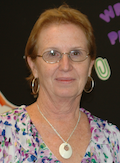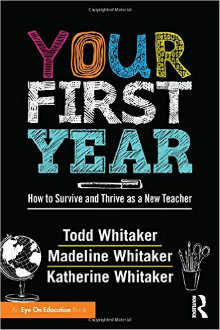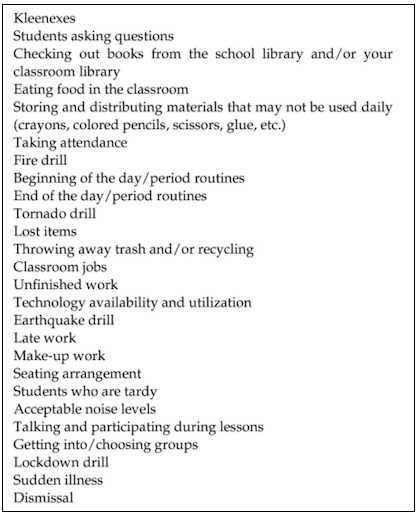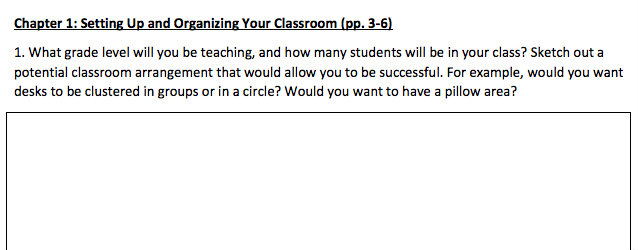Join the Whitakers for Your First Year
Your First Year: How to Survive and Thrive as a New Teacher
By Todd Whitaker, Madeline Whitaker, and Katherine Whitaker
(Routledge/Eye On Education, 2016 – Learn more)

Picture this! You have been waiting for the day that you will be teaching in your very own classroom. You have observed many teachers and gained insights into what a “well oiled” class looks like and, unfortunately, you’ve also observed classrooms that “needed a tune up.”
Your mind is full of ideas that you have gleaned from other teachers, the Internet, and books that you have read. But now you are officially a teacher in your very own classroom. Where to begin? How to begin? It’s overwhelming and a bit scary.

I wasn’t sure who to ask, what to ask, and where to find the answers. This book would have saved me many sleepless nights. If you are in similar shoes, hungry for a book with practical and useful information, believe me, this one’s for you.
An amazing resource for novice teachers
Todd Whitaker, renowned author and presenter, and his teacher daughters Madeline and Katherine have co-authored an amazing resource for novice teachers that should be handed out routinely before a teacher receives a teaching certificate.
The advice the authors provide is positive and encouraging, and serves to prevent some potential (and predictable) problems in the classroom. It is also a great review/reference guide for veteran teachers who are seeking to tune up their current teaching practices.
Start with procedures
The authors begin with the most important step in setting up the classroom, “Developing Your Procedures.” Although some of the advice may seem simplistic, the guidelines are written by teachers who are grounded in theory, have researched extensively, and have learned from “the school of hard knocks.” You learn by your mistakes and your successes. Following their advice is the first step in having a classroom that will be everything a new teacher has dreamed and more!
Classroom Stuff to Think of As You Prepare Your Classroom (page 9)
One of the bonuses of the book is the free study guide for pre-service and in-service teachers, with guiding questions and tasks for each chapter. Whether this is your first experience as a teacher or you have been teaching for quite a while, this study guide will help you examine your current teaching methodology, stimulate courageous conversations, and increase the likelihood of success for you and your students.
I would definitely consider starting a study group with other teachers, either online or in person, to examine your teaching practices and for veteran teachers to be able to share their knowledge and expertise.
(Example from Study Guide)
Classroom management
A great deal of Your First Year centers on classroom and student management. As a veteran teacher, I can vouch for the fact that if you don’t have the management skills and strategies at hand, your students will not receive the education you want them to receive.
Think about it. Have you ever been at a workshop where the presenter has not been effectively prepared and there is a constant background of “chit chat.” Think about how difficult it was for the presenter to bring the audience back. Now think about a classroom filled with eager-to-learn (or not so eager-to-learn) students. Once you have lost them, how can you bring them back? This book will help eliminate the need to bring the class’ attention back to you by providing strategies to use the moment they walk into your classroom.
Lesson planning
The section on “lesson planning and instruction” needs to be read once and then reread. Lesson planning is not copying a teacher’s guide or memorizing the text within the covers. I totally agree with the authors’ comment that “ there are not enough hours in the day to teach students everything they need,“ and you must make every minute count.
Their common sense suggestions give the reader an idea of how to meet the needs of the students in the class while following district curriculum guidelines. The short snapshots from elementary, middle and high school classrooms give the reader ideas of what might work their grade level.
Those adults in the school
I like the way the authors include all aspects of teaching. Teaching is not just words on a page but human interaction and collaboration.
Section III is entirely devoted to “Working With Adults” – administrators, peers, and parents. I was pleased to read the introduction to this section, rooted as it is in sensitivity and understanding. Working with adults can be a very delicate subject at times. “The adults we interact with can vary tremendously from school to school, grade level to grade level, department to department, etc. Our aim is to help everyone regardless of the dynamic they are facing.”(p.74)
A book every school should have on hand
I recommend this book without any hesitation. I think about how I wished this book was around when I first started teaching or when I first mentored novice teachers. It would have helped to take the angst out of the first year, provide practical ideas for classroom management, and help avoid any pitfalls when working with adults.
Your First Year can be just a great “go to” book to remind you that, yes, you are doing the right thing. As you read or reread the book, you will feel as if the authors are in your classroom with you, silently mentoring you with a personal touch!
It’s for novice teachers, veteran teachers, professors at teaching institutions, cooperating teachers, administrators. And, administrators, make sure this book is in the hands of your teachers and referred to often.
Linda Biondi is a fourth grade teacher at Sharon Elementary School in Robbinsville, NJ, and a long-time Morning Meeting practitioner. She’s also the recipient of several educational grants, a Teacher Consultant with the National Writing Project, and a participant on the NJ Department of Education Teacher Advisory Panel and with ECET2 Celebrate Teaching.



































